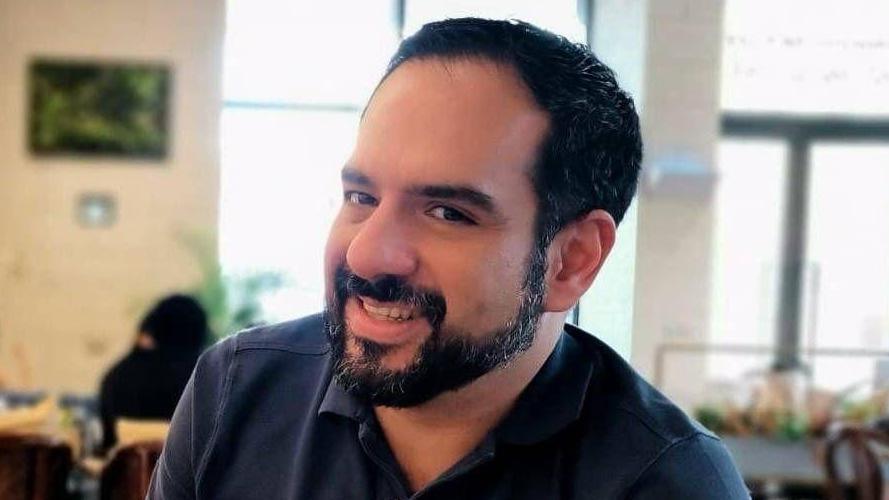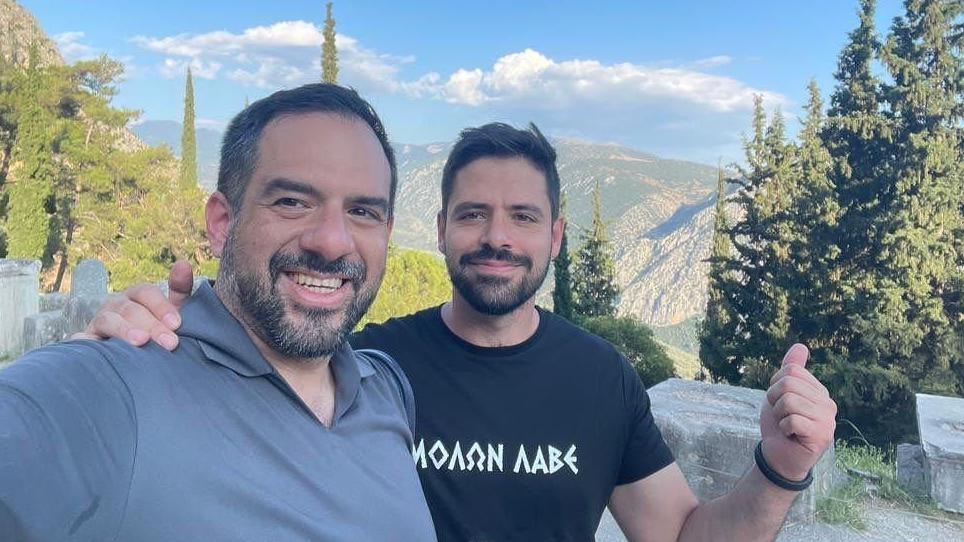Man arrested in Qatar Grindr 'sting' sentenced

- Published
A British-Mexican man who was arrested in Qatar in what his family called a “honeytrap operation” on gay dating app Grindr has been given a six-month suspended sentence and will be deported.
Manuel Guerrero Aviña, 44, was found guilty of being in possession of an illegal substance at a hearing in Doha and fined £2,100.
His family say police planted drugs in his apartment and Mr Guerrero Aviña believes he was targeted by the sting because he is gay.
Human rights group FairSquare called his trial a “travesty of justice” but Qatari officials insist the airline worker's arrest in February was solely due to drug offences.
'Qatar targeted my brother on Grindr - I want him home’
- Published2 May 2024
Mr Guerrero Aviña has called the verdict - which he is considering appealing - a human rights breach and says he was targeted because of his sexuality.
He said: "Although I welcome the fact that I can leave the country, I still condemn the unfair trial I have been subjected to and the torture and ill treatment I endured during my preliminary detention".
Mr Guerrero Aviña, an airline worker, said he is "taking advice" on his options.
Qatari prosecutors have up to 30 days to appeal the sentence, meaning he can't leave the country immediately, even if he were to accept the verdict.
James Lynch, co-director of human rights organisation FairSquare and former British diplomat in Qatar said the case was a "travesty of justice."
Homosexuality is illegal in Qatar, but the family of Mr Guerrero Aviña say he had lived a normal life there for the past seven years and had never been in trouble with the authorities before.
The case hit the headlines internationally when his family claimed he was targeted on gay dating app Grindr, after arranging to meet a man called "Gio".
But he was instead met by police and arrested on drug charges, in what his family called a "honeytrap operation".
After 42 days in a detention centre, Mr Guerrero Aviña was released on the condition he handed over his passport.
He was forced to thumbprint a confession written in Arabic, without the help of a translator or access to a lawyer's advice, his family say.
Qatari officials insist the 44-year-old's arrest was "for possession of illegal substances on his person and in his apartment" and that "no other factors were taken into account".
They added that tests for illegal substances in his system had come back positive for amphetamine and methamphetamine.
Amnesty International described the tests as "questionable" and not up to international standards. Mr Guerrero Aviña denies taking any drugs.

Enrique (right) previously told the BBC his brother Manuel's case sounded like "one from another century."
Aya Majzoub, Amnesty International's Deputy Regional Director for the Middle East and Africa, said in a statement, external that authorities in the country must overturn Mr Guerrero Aviña’s "outrageous conviction and lift his travel ban".
"There are serious fears that [he] was targeted for his sexual orientation and was coerced into providing the authorities with information that they could use to pursue a wider crackdown on LGBTI individuals in Qatar”.
HIV charities had also launched interventions in the case after claims Mr Guerrero Aviña, who is HIV positive, had not had regular access to his medication, which keeps the virus under control.
Mr Guerrero Aviña's family have told the BBC that his usual treatment, prescribed by British doctors, ran out in mid-April.
The UK's National Aids Trust told the BBC he urgently needs to return to the UK for the medication as it is not available in Qatar, and he may have built up resistance to it, which would make it less effective.
Deborah Gold, CEO of National Aids Trust, said: "We are hugely concerned that he will not be able to access the ongoing medical care and treatment that is his human right while in Qatar."
Mr Guerrero Aviña's brother Enrique told the BBC: "My brother is facing punishment in Qatar because he is gay."
"We will keep fighting until justice is serviced and until Manuel is safely back home."
A Qatari official said: "Contrary to certain media reports, no other factors were taken into account when making the arrest, and Mr Aviña has been treated with respect and dignity throughout his detention."